Utah
Youth sports coach in Utah charged with 18 counts of forcible sexual abuse of teen – East Idaho News

WEST VALLEY CITY (KSL.com) — A West Valley man who police say is also a youth sports coach is facing multiple felony charges accusing him of sexually abusing a teenage girl.
Jeffery Albert Alsop, 48, was charged this week in 3rd District Court with 18 counts of forcible sexual abuse, a second-degree felony; and four counts of dealing in harmful materials to a minor, a third-degree felony.
Alsop is accused of abusing a teen girl from about 2021 until September of this year. Investigators say the abuse happened at multiple locations, including Alsop’s home and his place of work, according to charging documents.
Prosecutors say they also identified a second teen girl who they say was abused by Alsop several years ago.
“While the state is barred from filing forcible sexual abuse charges as it relates to the second victim … it’s essential to acknowledge she was also victimized by (Alsop) when she was 17,” the charges state.
The Salt Lake County District Attorney’s Office told KSL.com on Wednesday that it cannot file charges in that case due to the statute of limitations expiring on that type of charge. However, the investigation into possible other charges is continuing.
Police say Alsop is a coach for a softball team with teen girls and a football coach for teen boys. According to social media posts, he was also a youth football coach this year.
Alsop also has a lengthy criminal history for mainly drug-related crimes, dating back to 1995, according to court records. He was in and out of the Utah State Prison frequently from 1997 through 2009.
=htmlentities(get_the_title())?>%0D%0A%0D%0A=get_permalink()?>%0D%0A%0D%0A=htmlentities(‘For more stories like this one, be sure to visit https://www.eastidahonews.com/ for all of the latest news, community events and more.’)?>&subject=Check%20out%20this%20story%20from%20EastIdahoNews” class=”fa-stack jDialog”>

Utah
Utah officials preparing for another winter with an increasing homeless population

When it comes to housing costs, the U.S. government uses a simple ratio to determine the ideal price: A house should cost the same as three years of salary, 3:1.
In Utah, three years will not even get you a living room and kitchen. Most recent data shows you need an average of 6.2 years of salary to purchase a home in the Beehive State, which has the third highest housing prices in the nation, behind Hawaii and California.
Wages across the country, Utah included, are not increasing at the same rate as housing costs, leading not only to trouble paying for housing — if you have it — but trouble keeping homelessness at bay. As Steve Waldrip, Gov. Spencer Cox’s senior adviser on housing strategy and innovation, states, the data above and more information from the Utah Office of Homelessness Services shows that ability to own a home is a key to preventing homelessness.
“Last year, we had 5,000 new homeless individuals in Salt Lake County,” he said. “With elevated pricing comes increasing pressure and we see more homelessness. But the most protected, or the most sure way to have housing stability is to have home ownership … and we’re seeing more and more people frozen out the housing market.”
On Tuesday, the Governor’s Office of Planning and Budget hosted a virtual discussion on housing and homelessness in the state. Participants received updated data and information about what appears to be working.
The message is being sent that homelessness and housing are issues to address now, given that without solutions, what will happen to Utah’s young people and children? Current data demonstrates that while Utah continues to grow, mostly from the movement of people from other Western states to Utah, young Utahns are moving out of state to the South and Midwest, places where they can afford a home.
There is not enough housing in the state, one of the many reasons for the increase in housing costs. Waldrip did note that the state does plan to build 35,000 starter homes over the next four years, but that does not answer the need for housing to prevent homelessness today.
Tricia Davis Winter, the assistant director of the Utah Office of Homelessness Services, notes the state has tried a variety of programs and solutions to get and keep those living in homelessness off the streets and into homes. In 2004, under Lloyd Pendleton, the “housing first” model was used, in which those living in homelessness were given places to live first and services later.
Utah now practices a services-first model, with hopes of getting people living in homelessness into homes as soon as possible once they have received the services they need.
But without any new affordable housing units, as well as an ever-increasing price of housing and rents, it is logical that — as much as advocates, nonprofit leaders and state officials may want to solve homelessness in Utah — there is no easy fix. That’s especially true this time of year.
“For the last many, many years … we have had to scramble — for lack of a better word — on finding additional emergency shelter,” Winter said. “The need we identified is for an additional 900 emergency shelter beds for the winter period.”
Despite the increases in everything but wages, progress is taking place, state leaders said.
Under HB548, passed during the last legislative session, consumers who purchase anything at Utah state liquor stores will have the opportunity to “round up” their purchase to the next whole dollar amount. The amount rounded up will be deposited in the Pamela Atkinson Homeless Account. These new funds will go directly to homelessness services and prevention. The program began this week.
A pilot micro-shelter program, which was examined last year, will continue for the time being. What has been described by Winter as a “wildly successful” project, the program targets people who are not in any of the area shelters but still need services.
Local officials say the state is discussing the topic of homelessness more and more each day. Long gone are the days when homelessness was a topic that only affected one group of people. Long gone are the days when programs were created only to be closed before results could be seen.
“We’ve had our ups and downs when it comes to homelessness and how we deliver services,” said Tara Rollins from the Utah Housing Coalition. “Sometimes we take five steps back and one step forward, but I think the things we’re doing are really starting to take shape in a very good way.”
Utah
The 10 Best Hikes in Utah’s National Parks
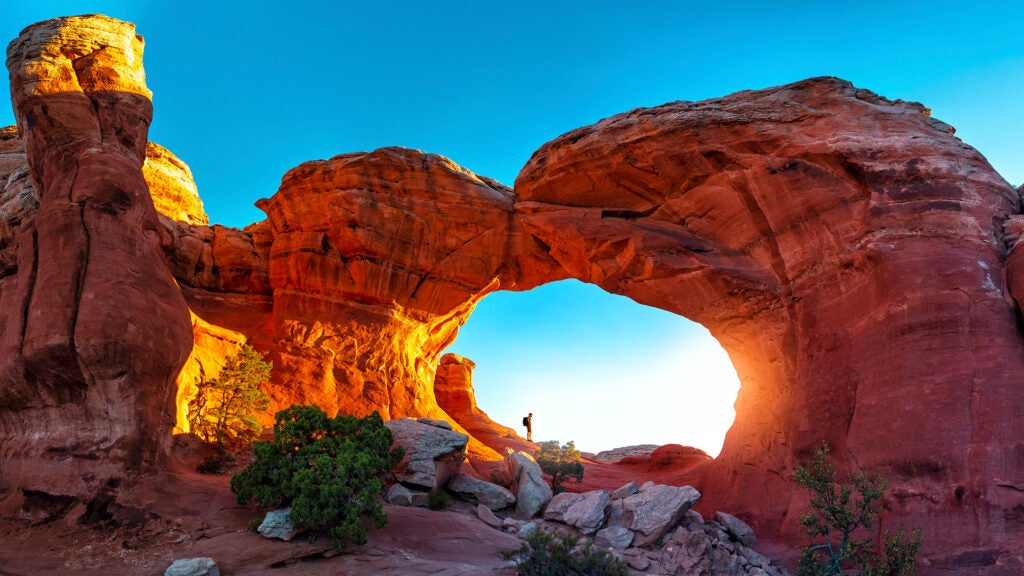
Utah is stacked when it comes to outdoor adventure. Not only does the state have some of the country’s most badass skiing and mountain biking, but it also boasts the nation’s third most national parks in any state, which include some of the world’s best hiking trails.
These protected meccas—Arches, Bryce Canyon, Canyonlands, Capitol Reef, and Zion, known as the Mighty Five—capture unique and stunning landscapes that represent the desert at its absolute finest, from striking sandstone arches to isolated slot canyons to lush oases. And over the years, I’ve been fortunate enough to visit all of Utah’s national parks. Some, during my explorations as a nascent single dude traveling in a diesel VW Jetta with pink bumpers looking for adventure (true story), and others later in life with my wife and kids in tow.
Do I have a favorite? Absolutely. Arches. Wait, Bryce. Definitely Bryce. Or, actually Zion. Okay… truth be told, I can’t pick one. They’re all breathtaking for different reasons, and for me, that’s an impossible task.
I did however pick my two favorite hikes in each park—one for beginners and one for the more adventurous—that you absolutely can’t miss when you go. Especially if you’re a first-timer to Utah’s national parks, consider these hiking trails the ultimate primer. And if you keep coming back as I do, maybe you’ll discover which park you like best. (Good luck with that.)
If you buy through our links, we may earn an affiliate commission. This supports our mission to get more people active and outside. Learn more.
Destinations Newsletter
Want more of Outside’s Travel stories?
Sign up here
Arches National Park
As the name suggests, Arches is loaded with more than 2,000 rainbow-like curved sandstone features within its borders—the highest concentration of such outcroppings in the United States. You’ll also find colorful cliffs, towering pinnacles, and balancing rocks that combine for a red rock landscape like no other.
Best Beginner Hike: Park Avenue
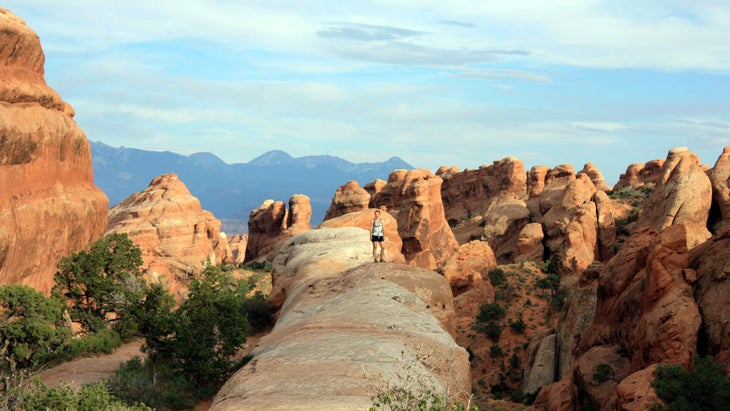
Yes, the national park is named Arches, but this hike takes you through the center of towering cliffs and spires, so tall they’re reminiscent of New York City’s skyscrapers. It’s popular, and can get crowded, but it’s a must-do when you’re in Arches. The 2-mile out and back takes you through the middle of the park’s signature outcroppings, including Tower of Babel, a distinctive, freestanding fin that is part of the larger group of Courthouse Towers. (Some people shuttle themselves via two cars and make it a mile-long point to point.)
Best Advanced Hike: Primitive Loop Trail
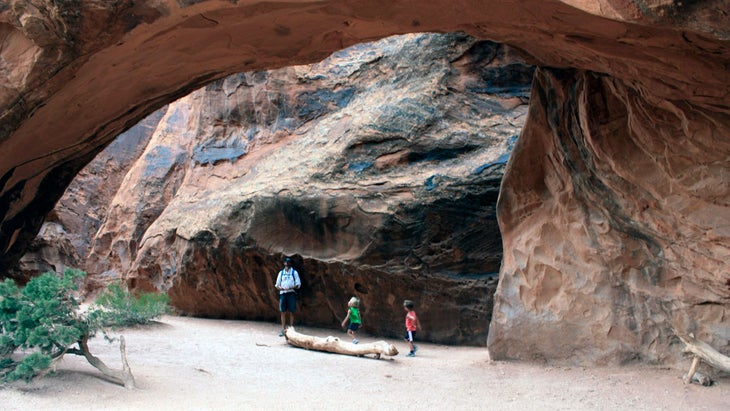
The 7.9-mile Primitive Loop, the park’s longest maintained trail, accesses a handful of distinctive sandstone features in the Devil’s Garden area and delivers the desert solitude you probably crave after navigating crowds at the park’s entrance. Its landscape-to-arches bang for buck, combined with the opportunity to ditch the masses, make this my favorite trail inside the park. Spur trails lead to Landscape Arch, which at 306-feet across, makes it the longest stone arch in North America. You’ll also be able to see Double O Arch, Private Arch, and the weird Dark Angel, a black sandstone spike emerging from the sand.
Pro Tip: Arches now requires reservations to enter the park (get them up to three months in advance) between April 1 and October 31. But show up after 4 P.M. and you can enter the park without advanced notice. Just bring a headlamp in case your hike goes longer than expected.
BOOK AIRBNBS NEAR ARCHES
BOOK HOTELS NEAR ARCHES
Canyonlands National Park
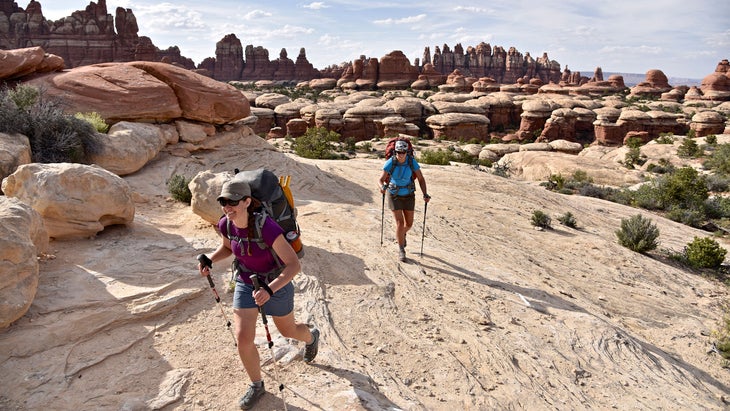
At 337,598 acres, Canyonlands is the largest national park in Utah, with three distinct regions; the day-hike-friendly Needles, Island in the Sky (which covers a plateau between the Colorado and Green Rivers), and the super remote Maze. The Needles has the most developed trails for hikers, as well as some of the park’s signature canyons and spires.
Best Beginner Hike: Mesa Arch
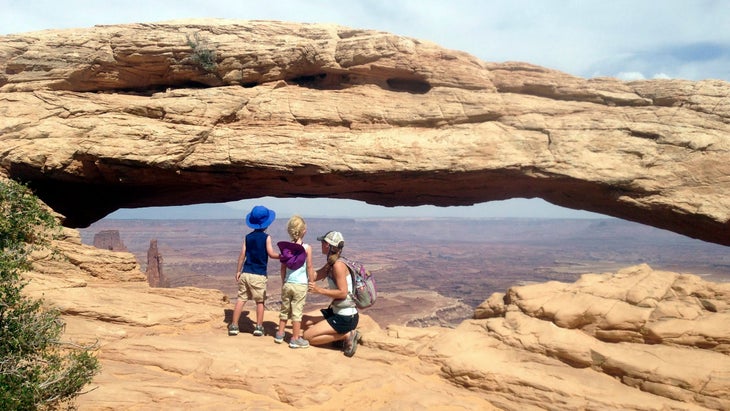
This .5-mile lollipop loop in the easy-to-access Island in the Sky District, delivers hikers to a 27-foot arch that’s perched on the edge of a cliff more than 1,000 feet above Buck Canyon. Peer through the arch and you can see some of Canyonland’s signature features, including the massive monoliths of Washer Woman and Monster Tower, as well as the La Sal Mountains beyond the park.
Best Advanced Hike: Chesler Park Loop
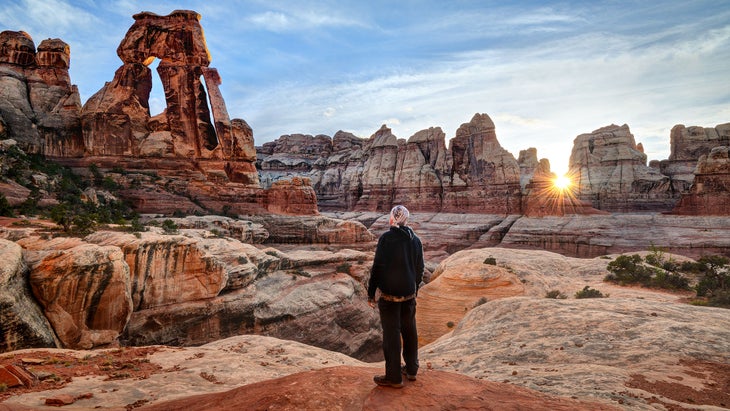
Hike some of the best scenery in The Needles District on this 12-mile lollipop that delivers the slot canyons and arches most hikers come to the area to see. The tread is slickrock and sandy washes as you combine four trails (Elephant Hill, Druid Arch, Joint Trail, and Chesler Park), which will have you squeezing through boulders and scrambling through stone notches. Chesler Park itself is a circular valley surrounded by towering sandstone spires.
Pro Tips: First, try to time your visit to Mesa Arch for sunrise, when the red rock cliffs framed by the structure are set aglow by the emerging daylight. Second, there are no reliable water sources on the Chesler Loop hike, so make sure you bring plenty for a full day in the desert.
BOOK AIRBNBS NEAR CANYONLANDS
BOOK HOTELS NEAR CANYONLANDS
Bryce Canyon National Park
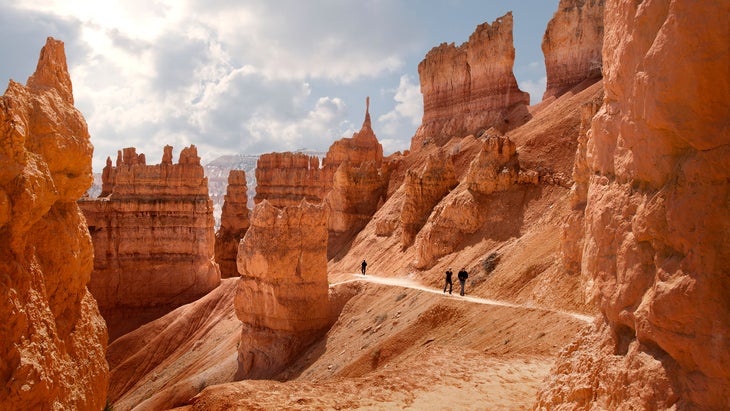
Hoodoos are a trip. These tall, stone spires look like huge versions of the drip castles you made as a kid on the beach, and Bryce Canyon National Park is full of them, as well as deep canyons, surprisingly lush forests, and elevations that top out at 9,100 feet.
Best Beginner Hike: The Rim Trail
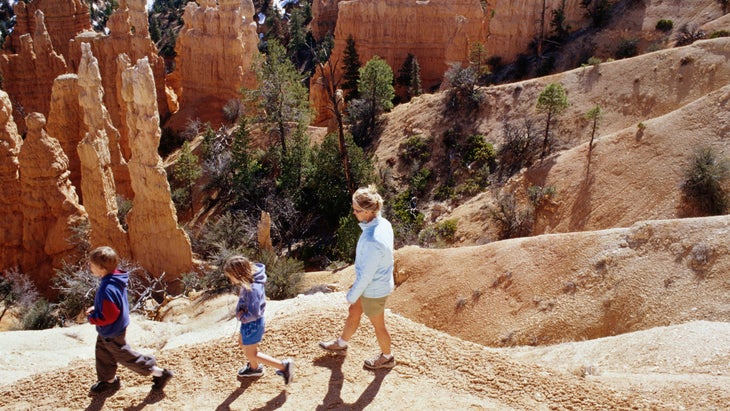
The Rim Trail traces the edge of Bryce Canyon for 5.5 miles, connecting two popular overlooks, Bryce Point and Fairyland Point. A free shuttle run by the park service hits multiple overlooks and access points along the Rim Trail, making it easy to treat this as a point-to-point, and there are three overlooks and trailheads along the way, so you can tailor the distance to your own ability. Do the whole thing and you’ll only gain 200 feet of elevation, while the views into the canyon offer peeks of the park’s grandiose canyons and spires, including the appropriately-named Thor’s Hammer.
Best Advanced Hike: Under-the-Rim Trail
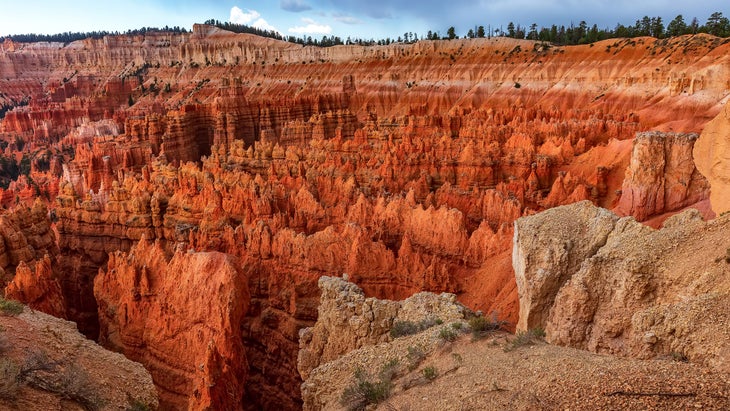
At 23 miles, you’ll need at least a couple of days to complete this point-to-point highlight reel of Bryce Canyon. But you’ll be glad you dedicated the extra time, as Under-the-Rim boasts serious backcountry goods, including views of towering orange cliffs, clusters of the park’s signature hoodoos, and even forests of ponderosa pines and aspens. It’s not an easy stroll as you’ll gain 5,500 feet along the way, but primitive backcountry campsites enable you to break it up into a multi-day effort.
Pro Tip: Bryce has a free park shuttle, but it doesn’t access Rainbow Point Trailhead, so you’ll need to hire a shuttle (Bryce Canyon Scenic Tours and Shuttles, from $15 per person) or have two cars complete Under-the-Rim Trail, or if you’re planning to hike the entire Rim Trail.
BOOK AIRBNBS NEAR BRYCE
BOOK HOTELS NEAR BRYCE
Zion National Park
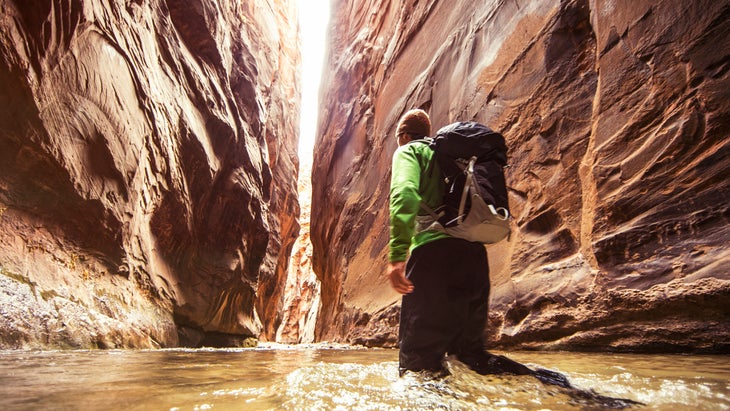
To say Zion protects a desert landscape would be too simple of a description. The 148,733-acre park actually encompasses an area where three distinct ecosystems, the Mojave Desert, the Colorado Plateau, and the Great Basin come together. The result is terrain that’s rich with canyons, lush river valleys, and soaring peaks. It’s also one of the most popular national parks in the entire country, with five million visitors last year.
Best Beginner Hike: Emerald Pools Trail
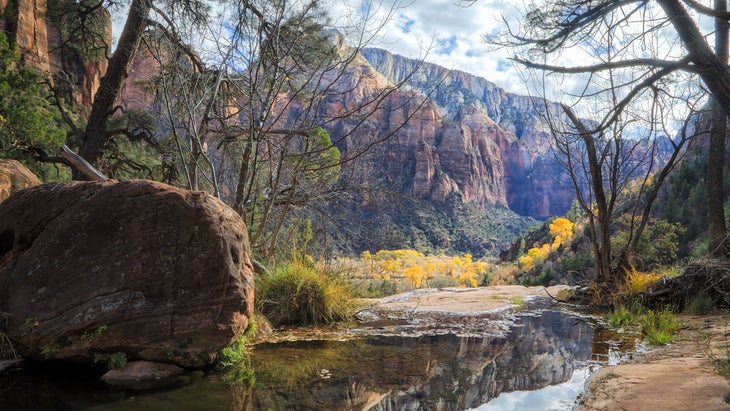
There are three Emerald Pools in Zion, each of which is an actual oasis in the middle of the desert, located on different tiers of a stream, tucked into the base of a massive, sandstone amphitheater. The Lower Emerald Pool, which is actually a couple of separate pools fed by a small waterfall that tumbles over an alcove, is wheelchair accessible via a 1.2-mile out and back. The Middle and Upper Emerald Pools are a little tougher to reach; a 2.5-mile loop accesses all three, but Upper is worth the effort, as the pool sits at the base of a massive sandstone wall. Show up in spring and all of the pools could be fed by seasonal waterfalls.
Best Advanced Hike: Orderville Canyon
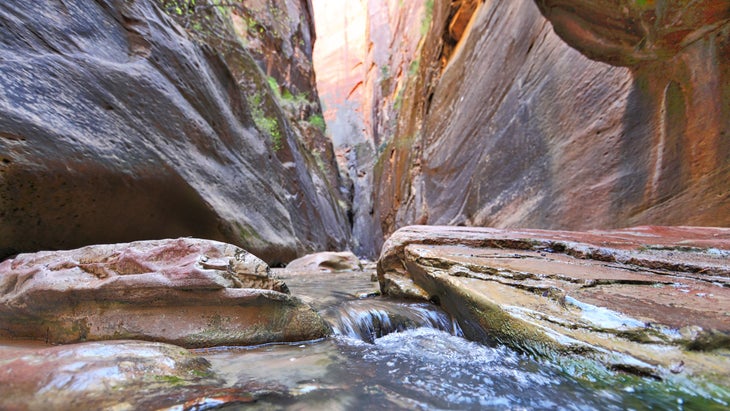
Yes, The Narrows is the park’s most lauded hike, but Orderville Canyon offers a similar experience over more technical terrain that keeps the masses away. The first few miles are easy going, but as you descend deeper into Orderville, the canyon narrows and becomes a tangle of boulders you have to climb and repel over, interspersed with springs and waterfalls. It’s a 12-mile point to point through a lush playground that should take a full day, and you will need technical skills and gear to tackle it safely. You’ll also need a permit ($10 per person). (If you’re not comfortable with canyoneering, hire a guide. Commercial guides can’t lead you through canyons inside the national park, but they can take you through similar canyons outside of the park’s boundaries.)
Pro Tip: Zion has a free shuttle that begins at the Visitor Center and delivers you to popular trailheads, but you need to show up early to get a parking spot. During summer, the first shuttle leaves the Visitor Center at 6 A.M. Be on it.
BOOK AIRBNBS NEAR ZION
BOOK HOTELS NEAR ZION
Capitol Reef National Park
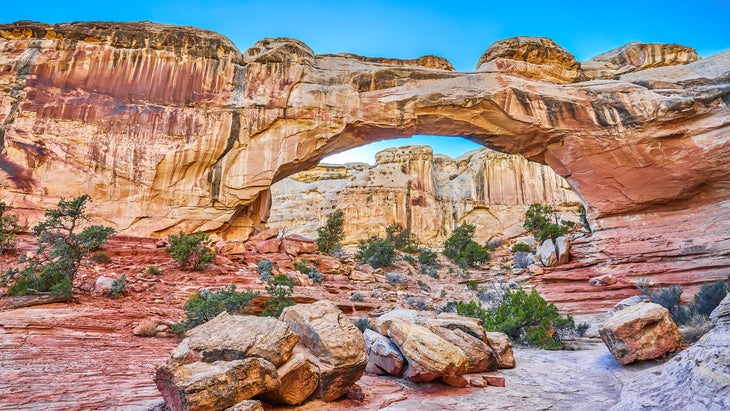
Natural arches and bridges, singular rock pillars, canyons… the 241,904-acre Capitol Reef is home to all of the highlights you’d expect from a national park in the desert of Utah. All of these features are a result of the Waterpocket Fold, a 100-mile long “wrinkle” in the earth’s crust made by an uplift of an underlying fault about 15 million years ago, which caused massive cliffs to rise and eventually erode into domes, towers, canyons, arches, and monoliths that are found throughout this park. Cool, right?
Best Beginner Hike: Grand Wash
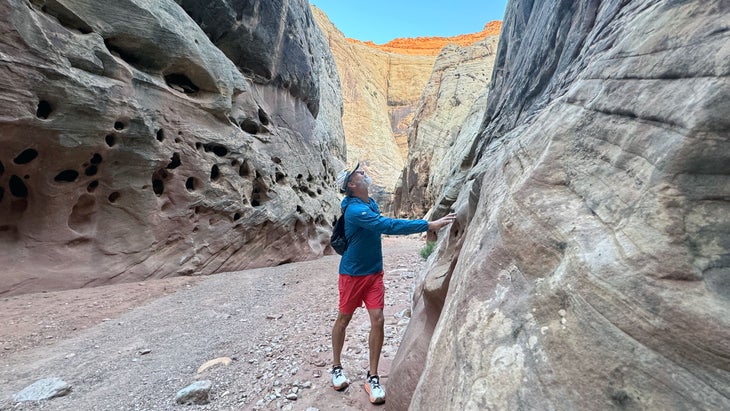
Grand Wash gives you a taste of the narrow canyons that people go ape over, but via a flat hike that’s easy to follow and super family friendly. The entire hike is a 4.4-mile out and back, but if you start on the Highway 24 trailhead, you enter the canyon early, with 200-foot vertical rock walls on either side of you, and can turn back when you’ve seen enough. After hiking a half mile over sandy terrain, the canyon begins to shrink and soon you’ll hit the narrows, which has slot canyon vibes without getting so tight it causes claustrophobia (the walls are about 20-feet apart at their slimmest point). The tan, sandstone walls are pockmarked with holes and small caves, and even offer shade in the morning and late afternoon.
Best Advanced Hike: Sheets Gulch Slot Canyon
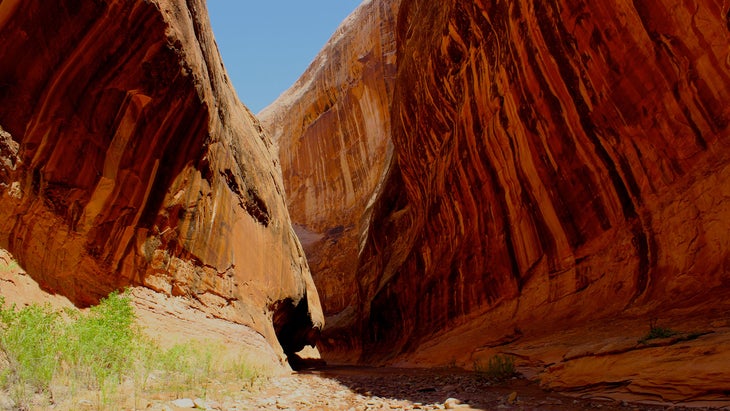
Capitol Reef has a bevy of canyons to explore, but Sheets Gulch might be the best non-technical option. There’s no official trail through the narrow gorge, which can be found 12.7 miles south of Highway 24 on the paved Notom-Bullfrog Road, but the occasional cairn and obvious route through narrow, sandstone walls make this journey relatively straightforward to navigate. (Bring a map, regardless.) While you won’t need ropes, you’ll need to muscle up and over several chockstones and wade through the occasional pool to keep moving forward, but that’s half the fun. It’s a 9-mile point to point, but most hikers turn around when the canyon begins to open back up, roughly 6.5 miles from the trailhead, making it a long, 13-mile all-day adventure.
Pro Tip: Bring a 4WD rig. The hikes I mention here are accessible via paved roads, but if you have a high clearance, 4WD vehicle, the entire backcountry of Capitol Reef becomes your oyster, and you’ll have options for free, primitive camping and an easier time getting into the remote Cathedral Valley—a backcountry district of the park where you can find a cluster of sandstone monoliths.
BOOK AIRBNBS NEAR CAPITOL REEF
BOOK HOTELS NEAR CAPITOL REEF
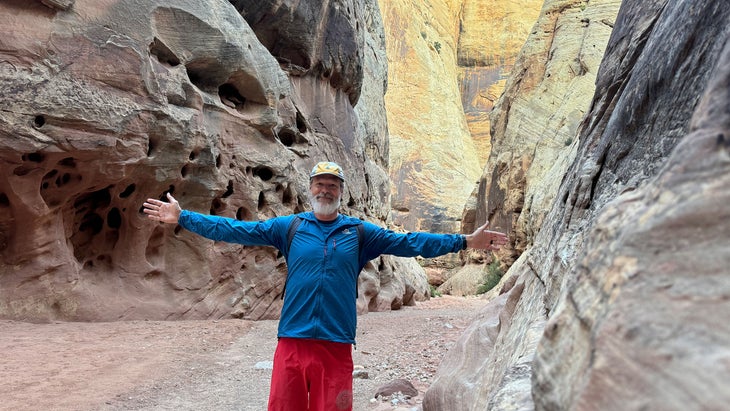
Graham Averill is Outside magazine’s national parks columnist. He’s fresh off of a trip to Utah, where he was able to hike portions of Capitol Reef National Park and Grand Staircase-Escalante National Monument. He also just survived Hurricane Helene at his home in Asheville, North Carolina and wrote about it, and ranked the best national parks in the nation for fall foliage.
Utah
Watson scores 12, Loyola knocks off Southern Utah

CHICAGO (AP) — Des Watson scored 12 points as Loyola Chicago beat Southern Utah 76-72 on Tuesday night.
Watson shot 3 of 9 from the field, including 2 for 3 from 3-point range, and went 4 for 6 from the line for the Ramblers (5-0). Kymany Houinsou scored 11 points and added six rebounds. Jalen DeLoach had 10 points and shot 5 of 7 from the field.
The Thunderbirds (4-1) were led by Jamir Simpson, who recorded 28 points. Dominique Ford added 18 points for Southern Utah. Jamari Sibley also had seven points, 10 rebounds and four assists.
-

 News1 week ago
News1 week agoHerbert Smith Freehills to merge with US-based law firm Kramer Levin
-
Business1 week ago
Column: OpenAI just scored a huge victory in a copyright case … or did it?
-

 Health1 week ago
Health1 week agoBird flu leaves teen in critical condition after country's first reported case
-

 Business4 days ago
Business4 days agoColumn: Molly White's message for journalists going freelance — be ready for the pitfalls
-
World1 week ago
Sarah Palin, NY Times Have Explored Settlement, as Judge Sets Defamation Retrial
-

 Politics3 days ago
Politics3 days agoTrump taps FCC member Brendan Carr to lead agency: 'Warrior for Free Speech'
-

 Science1 day ago
Science1 day agoTrump nominates Dr. Oz to head Medicare and Medicaid and help take on 'illness industrial complex'
-
/cdn.vox-cdn.com/uploads/chorus_asset/file/25739950/247386_Elon_Musk_Open_AI_CVirginia.jpg)
/cdn.vox-cdn.com/uploads/chorus_asset/file/25739950/247386_Elon_Musk_Open_AI_CVirginia.jpg) Technology2 days ago
Technology2 days agoInside Elon Musk’s messy breakup with OpenAI
















